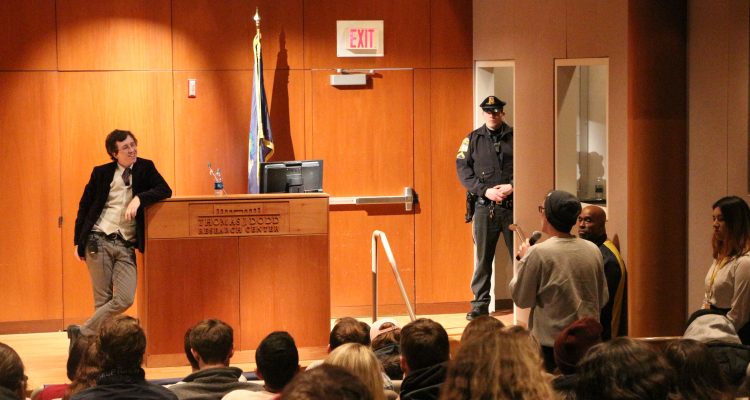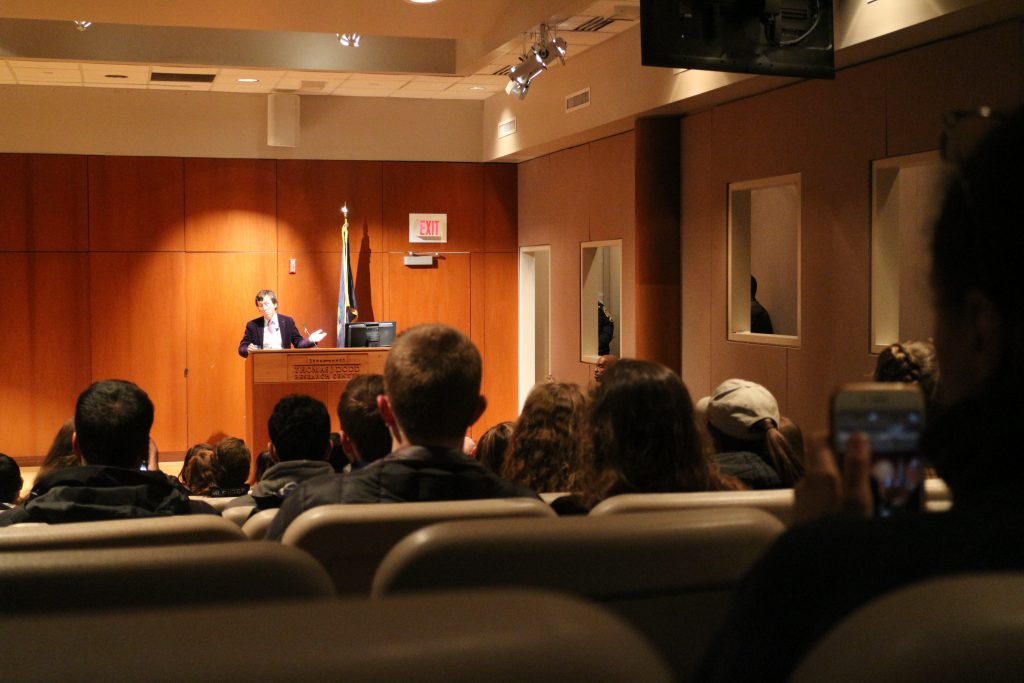In an alternative event to the anticipated speech of Ben Shapiro hosted by the University of Connecticut College Democrats Wednesday night, Nathan J. Robinson called for an honest conversation rather than a suppression of conservative views after describing Shapiro’s work as “riddled with inconsistency and intellectual dishonesty.”
“He’s not trying to get to the truth. He’s just trying to make other people lose arguments. He’s very good at it. I’d probably lose an argument with him, because he sees himself as a boxer. He wants to catch you out by asking you a question, and if you have to think about the answer for half a second, he goes, ‘Gotcha!’” Robinson said.
Editor in chief of the magazine “Current Affairs” and current Ph.D. student at Harvard University, Nathan J. Robinson hosted an event titled “Ben Shapiro is Not as Insightful as He Thinks He is” at the same time as the UConn College Republicans’ event with the conservative political commentator, Shapiro.
In his speech, Robinson stressed that the task for those who disagree with people such as Shapiro is to make sure the values of those people are eliminated rather than suppressed.
According to Robinson, it is far more beneficial to spend the time explaining counter-arguments rather than silencing a speech, because suppressing will not solve the problem.
“And one of the reasons, actually, that it seemed like Donald Trump had less support than he actually did, why he wasn’t going to win, was that we, on the left, succeeded very admirably in making it shameful to publicly admit that you were a Trump supporter and it was embarrassing; but, we didn’t actually keep people from holding the views that caused them to vote for Trump,” Robinson said.
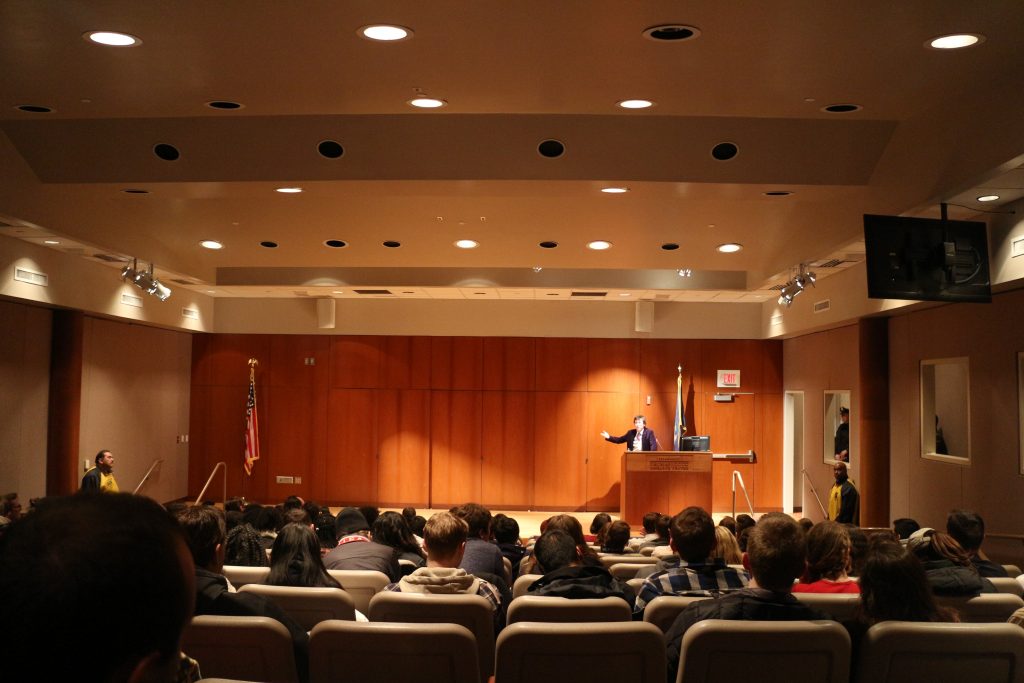
Nathan J. Robinson gave his speech “Ben Shapiro is Not as Insightful as He Thinks He Is” at the Konover Auditorium in the Dodd Research Center.
Photo: Daniela Doncel
This comes at a time when the discussion has risen over the past few years over whether or not the definition of open discussion has shifted on college campuses.
In articles written on platforms such as Vox, Time and the Atlantic, it has been stated that college students in today’s age are not open to hearing opposing opinions and do not believe in free speech.
Shapiro’s visit to UConn has added to the conversation by making headlines on the university’s offer of counseling because of his speech and on the heightened security for both his and Robinson’s event after the Lucian Wintrich event last fall.
According to a staff member of the Contemporary Services Corporation at the Robinson event, the personnel came from both Connecticut and New York, with about 56 of them from New York alone.
Robinson, however, said he believes the concept of preventing certain people from speaking is not far-fetched. It’s obvious why students have become more narrow-minded in who should be allowed to speak, Robinson said, because some topics are beyond debate.
“If someone said, ‘Jews are an inherently murderous people,’ that they should be forced out of their homes and deported, I don’t think you’d be sticking up for that person’s free speech rights or suggesting that that person ought to be invited to campus to contribute to dialogue. It would be very obvious why people didn’t want that person to speak. Nobody would say that college students are these crazy snowflakes if they wanted an event by a Holocaust denier cancelled,” Robinson said.
According to Robinson, there is no value in going to see Shapiro’s event, because he knows what Shapiro is going to say since they are essentially all the same.
Robinson said Shapiro has certain tactics with his speeches, such as choosing statistics he likes and ignoring those he doesn’t as well as intentionally trying to humiliate and attack those who speak against him.
“He’s not interested in having an honest discussion, okay? And we know that, because he says it. He says he’s not interested in having an honest discussion. He has a book called, ‘How to Debate Leftists and Destroy Them,’” Robinson said.
Robinson also said Shapiro feeds off the attention given to him, so if there is no reaction or response, then he will not have an audience to which he can spread his ideas.
Levi Green, a communications and women’s gender and sexuality studies UConn fifth-year student said he attended the event with the intention of not giving Shapiro that attention.
“When [Shapiro] is challenged, he uses a lot of misdirection, a lot of tactics to not actually answer direct critiques or criticisms of any of his ideals, and there’s a lot of spinning, and so I thought it would be more productive to attend this event rather than garner and give him the attention when I’ve seen multiple videos showing how he answers questions of critique. So rather than go to that event and feel like not much is happening, I would rather be here,” Green said.
Green said he supports those with opposing viewpoints who decided to go to the Shapiro event, but he personally felt it best to attend Robinson’s event.
Green also said he encourages those who support Shapiro’s event to listen more to what is being said by the left.
“I don’t consider myself a snowflake,” Green said, “Human rights are fun. I think empathy is a great thing, and a lot of these conservative speeches then oppose those. They have ideology and rhetoric that encourages for certain people to have rights taken away. I don’t think that makes me a snowflake; I think that makes me a genuine caring person.”
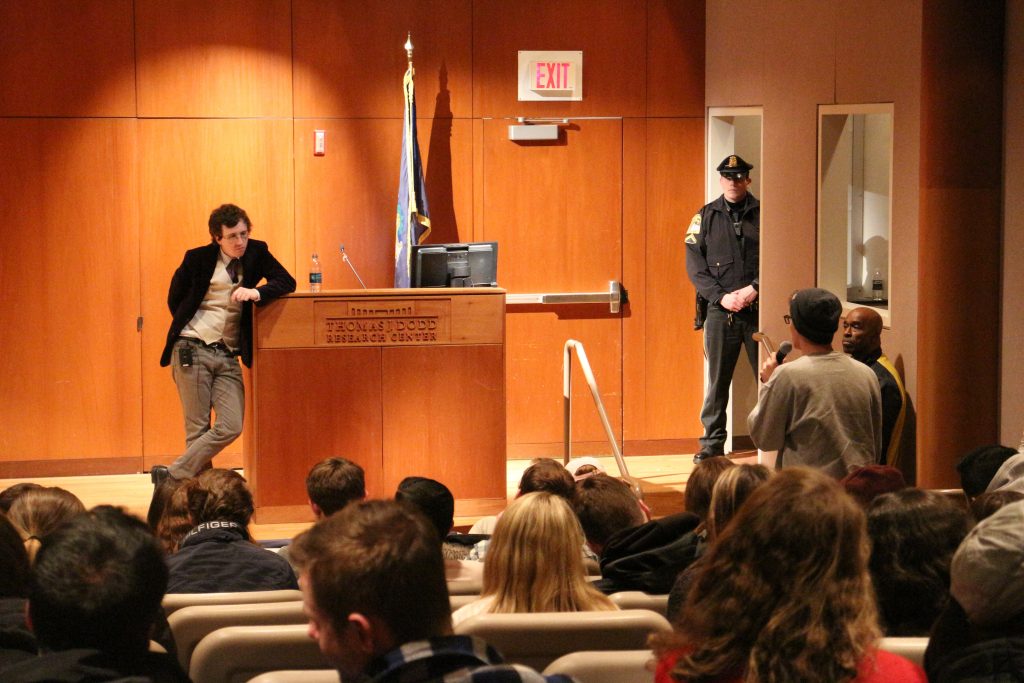
Levi Green asks Robinson a question during the question and answer portion of the event.
Photo: Daniela Doncel
During the question and answer session, Green asked Robinson how to engage with those of differing opinions online when the attention span of society has become far too short to even look past the headline before commenting.
Robinson answered, “Well, it’s you guys who study these things that are going to be able to do and are going to have to try to understand human psychology to develop ways to present information that are persuasive to people.”
Vice President of the UConn College Democrats Stephanie Goebel said this event was organized in only a week with the intention of having a counter-event to Shapiro’s after the incident with the Wintrich event last fall.
“The protest thing, it was great. It resulted in violence, and that wasn’t our aim this time around. We really wanted to make sure that nothing bad happened to any audience member here at UConn. This campus should be a safe, respectful zone for political debate,” Goebel said.
According to Goebel, she hopes students learn about what makes these conservative speeches so inflammatory and problematic and what they can do to combat the rhetoric.
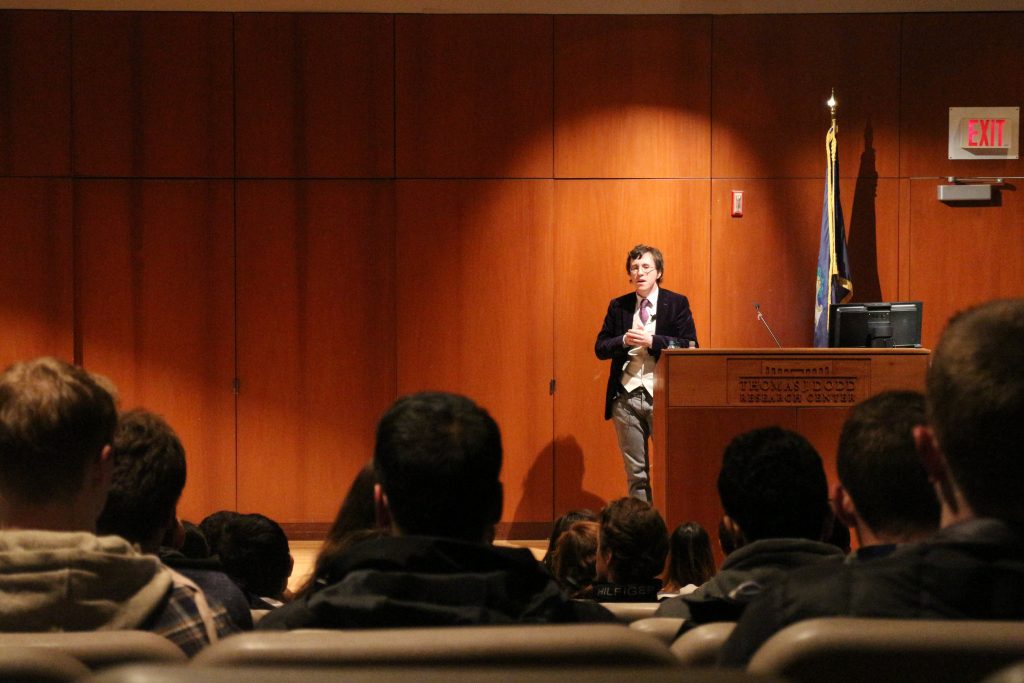
“It’s our job to make up for in compassion and humanity what [Shapiro] lacks. If we put our intellects together, if we thoughtfully be courageous in figuring out how to respond to obnoxious political figures like this, I think we can produce a persuasive counter to Ben Shapiro, and perhaps render him, for the first time in his life, speechless,” Robinson said.
Photo: Daniela Doncel
“What the left stands for is decent and humane, and that we’re not mad at the right because we hate speech and fear descent; but, we are mad because we hate needless war, we hate economic deprivation and we hate mass incarceration,” Robinson said.


